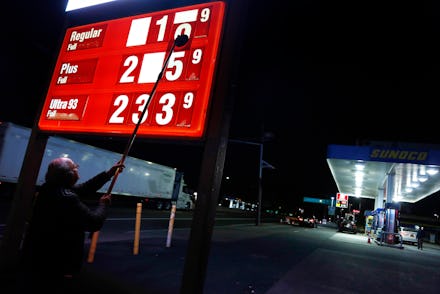Here's why the OPEC deal could mean higher gas prices for you

Being a car owner is already expensive — the last thing you want is to pay more at the pump. Alas, if you've been enjoying the prolonged period of cheap gas prices, there's bad news: They might be finally coming to an end.
Average prices rose five cents a gallon to the current national average — roughly $2.16 — just between Monday and Wednesday, according to GasBuddy's petroleum analyst Gregg Laskoski.
While that might sound small, changes in price add up quickly: In just two days, that's about 60 cents more to gas up the typical small car, which holds 12 gallons of gas.
Unfortunately, your pocketbook pain may get even worse, especially by the holidays.
A second GasBuddy petroleum analyst, Patrick DeHaan, said that prices should continue to rise for the next couple of weeks, likely peaking around Christmas, before falling again — potentially.
"It's all but guaranteed now that gas prices nationally will likely average 5, 10, maybe even 15 cents higher on Christmas Day," DeHaan said. "We're looking at an average of about $2.30 to $2.40 a gallon ... and then leveling off, maybe back down to $2.25."
The prices are rising, Laskoski said, because of recent actions taken to raise oil prices by the Organization of Petroleum Exporting Countries, commonly referred to as OPEC — a cartel made up of Saudi Arabia, Iran, Venezuela and 11 other countries.
What is OPEC?
In addition to setting policy and providing member states with technical and economic assistance, OPEC also tries to keep oil prices steady, so that its members, which rely heavily on oil, aren't disrupted by big price swings.
On Wednesday, the group's member states all agreed to start producing less oil next year to get prices up — the first time they've done so since 2008.
The price of crude oil and gasoline are not perfectly correlated, Laskoski said, but they do tend to rise and fall in tandem with one another.
OPEC's actions are meant to try and stop what's been an historically long period of low oil prices, which have been punishing to its member states. Saudi Arabia, for instance, has been forced to make deep cuts to subsidies and public spending over last two years to cover the shortfall.
Experts disagree about whether OPEC countries are all likely to make good on the deal, since the organization has traditionally had trouble getting all of its members to play by the same rules, and the success of the deal depends in part on cooperation from Russia, which is not a member state.
"The culture among OPEC members is that everyone cheats a little bit," DeHaan said. "It's what can they get away with."
How high could gas prices go?
If the OPEC deal falls apart, then prices would likely drop back to lower levels — and that's certainly still a possibility, said Laskoski.
But Phil Flynn, an energy market analyst with futures broker Price Futures Group, said he thinks the deal will be upheld.
"People are going to be amazed at how compliant people are going to be with the agreement ... it's in everyone's benefit," Flynn said, adding that prices could start to rise in just a few months if the OPEC members all play nice.
Flynn said he sees gas prices going up between 20 and 25 cents per gallon over the next month — and then more price hikes could be in store. By the summer, which is when gas prices are typically highest, he said prices could average $3 a gallon.
That's not necessarily a bad thing for economic growth, even if it sucks for consumers.
"It's actually going to help the U.S. economy," Flynn said. "People don't realize that the U.S. is one of the biggest oil producers in the world, and our producers have been hurt by these prices too ... They've put a lot of good guys with big salaries out of work."
There may be truth to that idea: In November, during the wake of of President-elect Donald Trump's unexpected victory, several economists told Bloomberg that low energy prices presented a major obstacle to Trump's plans to create more energy jobs.
Finally, since cheap oil "has also hurt alternative fuels," Flynn said, rising gas prices could actually help boost energy sources with less damaging effects on the environment and climate change.